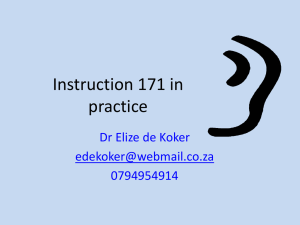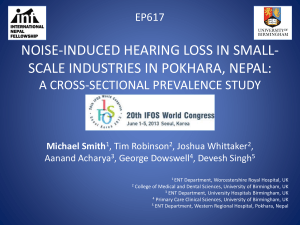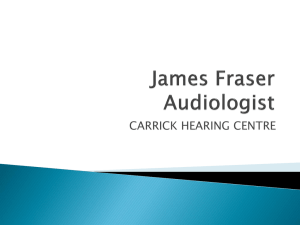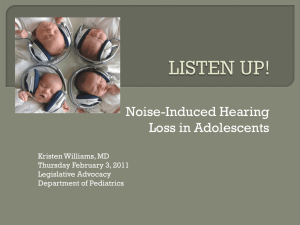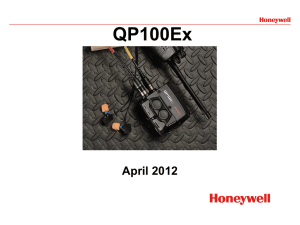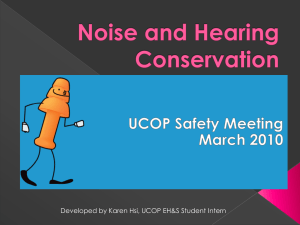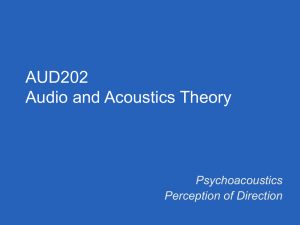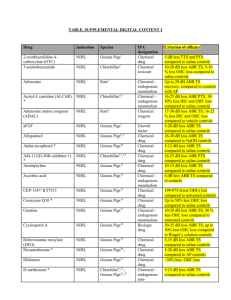noise-induced hearing loss in asia - National Hearing Conservation
advertisement
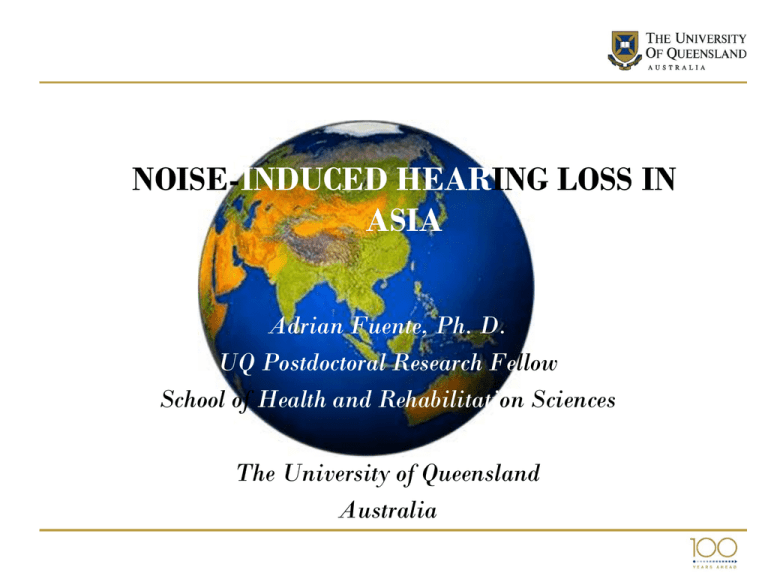
NOISE-INDUCED HEARING LOSS IN ASIA Adrian Fuente, Ph. D. UQ Postdoctoral Research Fellow School of Health and Rehabilitation Sciences The University of Queensland Australia Aim of the presentation To discuss the current situation of noise-induced hearing loss in Asia. Agenda • • • • Background The current situation of NIHL in Asia Research on NIHL in Asian countries Summary ASIA- Background • Asia comprises 47 countries. • It is rich in natural resources, such as petroleum, forests, fish, water, rice, copper and silver. • Manufacturing in Asia has traditionally been strongest in East and Southeast Asia, particularly in mainland China, Taiwan, South Korea, Japan, India, Philippines and Singapore. ASIA -Background • It is the world’s largest and most populous continent. • Four billion people which represents 60% of the World’s current human population. • For countries such as Bangladesh, Nepal, and Pakistan, the informal sector represents 70 per cent of the total employment (ILO, 2003). • Huge range of different cultures, income level, environments, historical ties and government systems. ASIA- Background • Japan and South Korea continue to dominate in the area of multinational corporations, but increasingly mainland China, and India are making significant inroads. • KEY ISSUE • Many companies from Europe, North America, South Korea and Japan have operations in Asia's developing countries to take advantage of its abundant supply of cheap labour and relatively developed infrastructure. The current situation of NIHL loss in Asia DALYs Common scenario Legislation DALYs Common Scenario Common Scenario • Despite the existence in many countries of regulations that establish maximum limits of noise in the workplace, these regulations are under enforced. • Some other Asian developing countries still lack legislation regarding noise exposure in the industry. • A common characteristic in developing Asian countries is the limited resources spent in implementing hearing conservation programmes and in controlling noise sources through engineering techniques. Common Scenario • Other variables that make a hard task the implementation of hearing conservation programmes in the developing world are the lack of hearing health care professionals, the absence of awareness of the ill-effects induced by noise, and a not minor one, the low educational level of laborers Legislation Taiwan • In Taiwan, the decrease of noise exposure has been indicated as the second most crucial issue for safety and hygiene of labours’ workplace. • Article 2 of the Labour Safety and Health Law Enforcement Rules of Taiwan defined noise over 85 dB(A) as “extraordinary hazard to health”. • A noise-induced hearing loss surveillance system with periodic annual audiometric examinations for workers who are exposed to noise >85 dB(A) was also established in Taiwan in 1995. Compensation • Saudi Arabia – NIHL is compensated by the General Organisation for Social Insurance (GOSI). It includes hearing loss as a result of all operations, occupations and industries which are associated with the generation of noise and loud sounds that are liable to affect hearing. – Calculation: The monaural impairment for each ear must be calculated. Average threshold values of 0.5, 1, 2, 3 kHz. Then 25 must be subtracted from the previous result. India • NIHL has been a compensable disease in this country since 1948, but it was only in 1996 that the first case was compensated. • The first case was an air conditioning plant compressor operator (compensated in 1996) • The second case was a textile mill worker (compensated in 1997) India • As per Indian laws, a worker presenting with NIHL and a history of working in a noisy environment is eligible to receive compensation provided he/she gets a certificate from any medical practitioner. The affected worker does not have to prove a cause-and-effect relationship. • The permissible exposure limit by Indian laws is 90 dB for an 8-hour shift. India • So why???.. Lack of awareness among the workers and indeed among the health professionals. The undergraduate curriculum in India does not equip doctors to diagnose occupational diseases and there are no postgraduate courses in occupational health in India. RESEARCH ON NOISE-INDUCED HEARING LOSS IN ASIA Characterisation of the Population Prevalence Sources of Noise Industries Hearing Conservation Programs New Approaches on the Prevention of NIHL -Genetics -Protection against NIHL - Susceptibility Efficacy/ effectiveness PubMed entries • Noise-induced hearing loss in Asia – 120 entries • 8 reviews • Noise-induced hearing loss in the United States – 819 entries • 76 Reviews • Noise-induced hearing loss in Europe – 626 entries • 25 reviews MeSH NIHL, Asia (93 valid entries) Categories • Susceptibility: – Genetics, covariates, associations • HCP – Awareness of NIHL, use of HP, Policies, new methods or approaches to hearing conservation • Prevalence – Prevalence of NIHL is specific industries or globally in a specific country. • Environment – Noise levels in cities, noise exposure of police officers, construction workers • Others – New methods for the diagnosis of NIHL, histological studies in animals, antioxidants Susceptibility (7 valid entries) HCP (13 valid entries) Prevalence (49 valid entries) Environment (11 valid entries) Others (11 valid entries) Web of Science (1016 valid entries for NIHL) Web of Science –NIHL and affiliation of authors Summary • Asia is a heterogeneous world region NIHL is a big issue in Asia • Legislation does exist in some Asian countries • Legislation under enforced • Lack of awareness of NIHL among employers and employees • Research on NIHL is still mainly focused on prevalence, though in a few number of countries Thanks for your attention a.fuente@uq.edu.au
